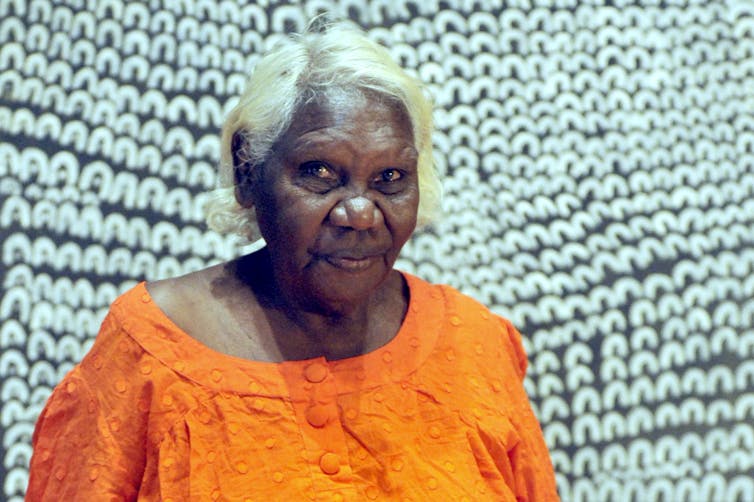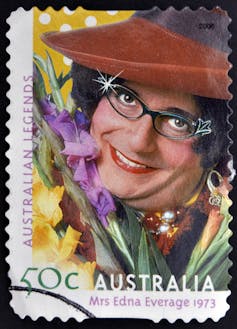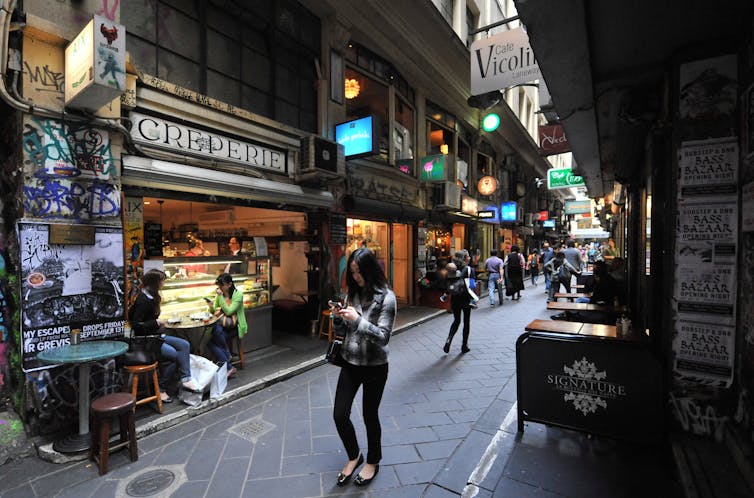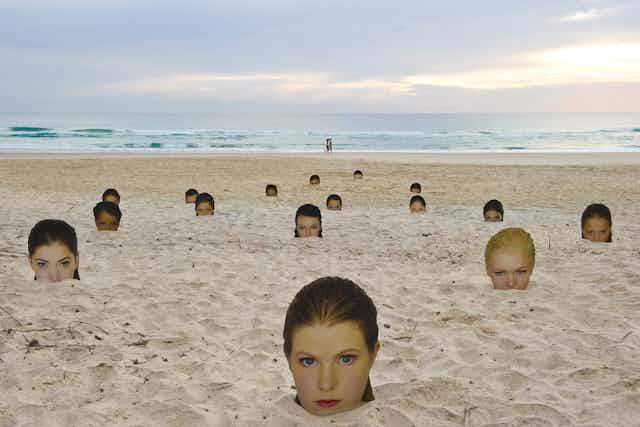Why doesn’t Australia get culture? What is it about culture that defeats our perception to the point where, like an unwelcome magic trick, it vanishes as an object of collective concern?
For a country so settled it has no dialects and doesn’t bother with a national bill of rights, what is it about culture – the normal accompaniment of national cohesion – we fail to discern and value? Why does the nasally satire of Monty Python’s “Bruces” sketch still bite, 43 years after it was first broadcast?
Why, after all the attention, achievement and acclamation our cultural sector has garnered, when it has ballooned in size and financial contribution, when it is part of every moment of our complex waking lives, is it often regarded as little better, in the inimitable words of Barry Humphries’ character Sandy Stone, than a very nice night’s entertainment?
Reading some of the responses to my Conversation article on a proposed “super ministry for culture” published in August this year, I wondered from what inexhaustible well of ignorance Australia’s educated class draws its elixir of cultural deafness.
All Australians
Today, culture matters more than ever. The 19th century was the age of mass military mobilisation, the 20th of mass economic mobilisation. The 21st century is the age of mass cultural mobilisation, and beyond the immersive hedonism of our shopping malls and the art-free minds of many of our politicians, collisions rage between whole ways of life in which culture is the content, framework and bloody inspiration.
However dysfunctional such polities may be, they are aware in a way that we are not of the centrality of culture, its capacity to be both limitlessly diverse and powerfully binding. We are not all rich. We are not all white. But we are all Australians, of one kind or another.

That should mean more than footy loyalties and welling up with tears on Anzac Day. It should mean an internal order of value that allows us to articulate who we are and engage with those who are not as we are.
A national culture is not the opposite of cosmopolitan awareness. It is its ground and guarantee. Without a grasp of the importance of our own culture how can we appreciate anyone else’s?
The accident of English
There are two reasons why Australia’s sense of a national culture is weak and intermittent. The first is to do with language. The accident of English allows us to free-ride the cultural goods and services of the two international powers that have so far dominated our fate, Britain and the US.

Our quest for independence did not involve the assertion of a separate linguistic identity, as with Israel, or a contested one, such as bilingual Canada. Uniquely among post-colonial countries we do not have a national theatre. Instead, we are a net cultural importer, soaking up the art developed for other people and sensibilities.
I grew up the son of a (very) English father and a (trenchantly) Australian mother, the recipient of two different ways of looking at culture that don’t meet on equal terms. The Anglo-Saxon countries cast a long shadow, supplying us not only with cultural objects and experiences but with expectations too.
As Australian writer AA Phillips famously put it in 1950:
In the back of the Australian mind, there sits a minatory Englishman … Subconsciously the educated Australian feels a guilty need to placate this shadowy figure.
This ascendancy has lessened over the years but has it gone away? Watching the Australian film industry wither on the vine, our television drama go from worse to worser, and our theatre gorge itself on foreign classics, it’s tempting to think not.
The second reason has to do with our peaceful history. No major wars have been fought on Australian soil (or none that we openly acknowledge, at any rate). Our cultural consciousness has never been pushed into sharp awareness by invasion or forced colonisation.
Geoffrey Blainey’s The Tyranny of Distance has allowed a feeling of unthreatened relaxation that has bordered on inertia. Culture touches everyone’s life. But because no-one has ever tried to take ours away, it remains under-served.
Unless you are Indigenous, of course, in which case you will be acutely aware that in the modern, mobilised world, politics and culture are the same side of the one coin.
Turning away
“When I hear the word culture I reach for my revolver,” is the threatening quote often misattributed to Hermann Göring, Nazi founder of the Gestapo. Yet the Nazis became the greatest patrons of the arts since Emperor Nero went into the music business.
Obsessed with projecting German supremacy in every sphere, the second world war was fought on the cultural front as well, with artists drawn into a savage struggle for hearts and minds. After 1945, Europe and America started promoting their own culture, getting serious about it once they realised that’s where most people live their lives.
Increased leisure time, the egalitarianism war’s sacrifices brought, and a new interest in cultural activities of all kinds, led to arts councils, touring programs, cultural exchange.
Looking at the sorry mess of the Middle East and Afghanistan today you feel that’s a lesson the West needs to learn all over again.
Australia never learnt it. We took an opposite tack, erecting a barrier designed to keep the rest of the world out – the White Australia policy. In turning away from the world, we turned away from ourselves. The cultural history of Australia in the 1950s and 1960s is depressing not because so little happened but because so much tried to.
As good as it gets
Australia is now one of the most privileged countries in the richest epoch in the whole of human history. Economically, it doesn’t get much better. Yet the last election was fought in a flailing panic of gratuitous materialism and widespread whinging about standards of living.

Journalist Tom Allard noted “the disconnect between reality and sentiment”. Meanwhile, economist Professor Ross Garnaut warned:
a new political culture that elevates private over public interests and the immediate over the longer term. If we continue within the political culture … we will live in greater comfort for a short while. But sooner rather than later we will experience deep economic recession with high unemployment. We can expect bitter conflict within our society, and unhappiness about our institutions.
A sense of culture
We are a country not without culture but without a sense of culture. That distinction is crucial. Australia does not lack art, artists or audiences. But as a nation we find it hard to see culture in any but consumerist terms.
Debates about cultural value degenerate into stoushes over personal preference – Schoenberg symphonies versus school concerts, elitism versus equity. Lack of catholicity of taste transmutes into cultural rigidity, even intolerance. For all the talk about a technologically-connected world and the Asian century, the drivers of our national imagination feel querulous and underpowered.
Launching Sophia Turkiewicz’s Once My Mother in August, for example, Australian director Robert Connolly delivered a withering assessment of the current state of documentary film financing.
Turkiewicz starting looking for support in 1975 – which makes her hardihood notable even by Australian standards. Long-form documentaries fall between the cracks of current production models. That this is more than a glitch is evidenced by the fact documentary film-making is fast migrating to the internet, where interactive, multi-platform formats offer greater diversity and creative sophistication.
In 2011, Once My Mother finally attracted support from Screen Australia’s Signature Documentary Program, a fund established in 2011 aimed at documentary storytelling that is bold in form and content.
Turkiewicz’s film focuses on her Polish refugee mother: “a story of survival and forgiveness, explored through a troubled mother and daughter relationship, revealing an epic journey from a Siberian gulag to safety in Australia”.
Its advance screenings attracted warm commendations from film directors Bruce Beresford and Peter Weir, giving Connolly a platform to lambast the myopia of Australia’s cultural gatekeepers:
For two years I watched [Turkiewicz] grinding heroically away for love and no money […] Given the obvious quality of the work, it made no sense. Actually, it all too depressingly made entire sense. For reasons best known to them, the then ABC and SBS commissioning editors repeatedly passed on the film […] and because the way things currently work, no SBS or ABC presale means no funding body support, and no funding body support usually means no film.
Stories of systemic frustration can be found in every area of Australian culture, both the traditional high arts and the newer creative industries. They indicate a situation whereby commercial imperatives block artistic ones because the internal order of value that should keep them in productive tension is not present to the needed degree.
Due process
So where do we go from here? Fortunately, Australia’s weak sense of culture has produced a compensating strength: its cultural policy process.
Meeting with some UK researchers earlier this year I heard the same admiring message time and again: how cultural policy in Australia is bold, comprehensive and of high quality, a real attempt to cast the problem of culture beyond the doings of a few lead institutions. This is not a partisan achievement.

Labor and Liberal governments have both contributed to developing cultural policy as a positive field of endeavour. Given that the bureaucratic provision of something as wayward as culture is difficult to begin with, Australia has done well in utilising its support infrastructure (the Australia Council is going strong 15 years after the UK replaced its own independent Arts Council with a hands-on Ministry of culture which, surprise, surprise, doesn’t work any better).
“A strong and slow boring of hard boards,” is how the German sociologist Max Weber described politics. Those boards are doubly thick when it comes to culture. Nevertheless, good cultural policy is crucial for all those who want to see Australian culture well served and serving Australia well.
Culture warrants a high position in the new government’s pecking order. If Australia is to get culture any time soon, it will need leadership from the centre. The administrative machinery and money are there (despite our complaints).
What’s needed is an evolved policy vision.
This is a foundation essay for The Conversation’s new Arts + Culture section. If you are an academic or researcher with relevant expertise and would like to respond to this article, please use our pitch facility.
A previous version of this article included the line: “For a country so settled it has no dialects and doesn’t bother with a written constitution …”. This was amended on October 29 to more closely reflect the author’s intentions.

